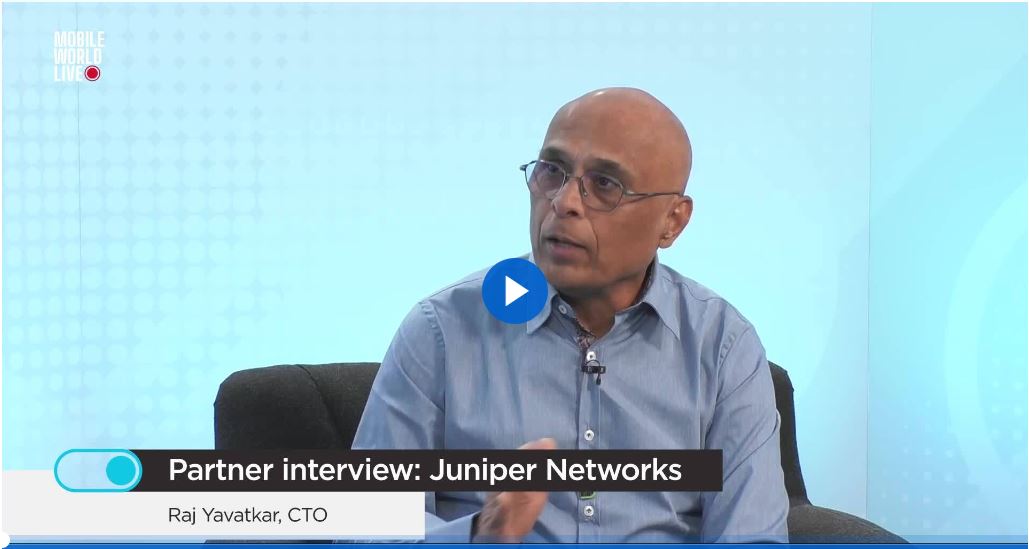Mobile World Live Interview with Raj Yavatkar about AI Native Networks


Why are AI-based networks necessary?
Raj Yavatkar, CTO at Juniper Networks, discusses three aspects of AI-Native Networking that help companies provide a reliable network that is secure and responds in real time.
You’ll learn
How AI is simplifying network operations and improving end user experiences
The importance of building better and more efficient networks for AI learning
How to increase the efficiency of AI networks
Who is this for?
Host

Experience More
Transcript
0:03 I'm here at mwc Barcelona with the CTO
0:06 of Juniper Networks Raj yatka thank you
0:09 very much for joining us today thank you
0:11 Chris why are AI based networks
0:14 necessary and what Innovations are
0:16 coming to life because of this
0:17 technology so if you look at
0:19 traditionally the networks have always
0:21 been operated manually right so are
0:24 there two end consumers of the network
0:27 end users which have devices like I
0:30 phones and all and the end to operators
0:32 who operate the networks operators
0:35 always have been working with multiple
0:36 dashboards doing things manually in the
0:39 world of AI we had to move away from
0:41 that where they should be just trusting
0:44 the network to work Network should be
0:47 invisible if you look at end users in
0:49 the iPhone generation people have got
0:52 used to uh Network that just works on
0:56 our iPhone we don't care about it so our
0:59 idea behind AI for networking is to
1:01 build this what we call Modern AI native
1:04 networking platform based on AI Ops
1:07 which makes Network Invisible by
1:09 collecting right s of telemetry and
1:12 using machine learning to make sure
1:14 Network stays operational so one of the
1:16 things we have done is that last N9
1:18 years we have been working on collecting
1:19 data from the network applying data
1:21 science for n and insights so that based
1:25 on Security based on realtime responses
1:29 and network that that's reliable we can
1:31 provide connectivity using what we call
1:33 AI native networking platform it has
1:35 really two aspects one is apply AI for
1:38 networking so operations become
1:40 simplified and automatic and the other
1:42 is networking for AI so you can build
1:44 networks to support
1:45 AI so you've enhancing the power of AI
1:48 to make connections better but there's
1:49 another side to this as well about AI
1:51 workloads can you tell us a little bit
1:53 more about that that that's a very good
1:55 point so if you look at um generative AI
1:58 the latest Revolution it's all about
2:00 training large language models and when
2:03 you train these models you use clusters
2:05 of gpus and this is the most expensive
2:09 resource when you do that right and you
2:11 cannot you have to keep them occupied
2:13 you cannot leave them stranded waiting
2:15 for response from other gpus then the
2:17 network plays a very important role to
2:19 provide very low low latency High
2:22 throughput reliable communication that's
2:24 a network fabric for training AI
2:27 clusters so what we're doing is that we
2:30 have abstar based Network automation it
2:33 really helps with two aspects of the
2:34 network Day Zero where it's intent based
2:37 you express the intent and it
2:39 automatically configures and Designs the
2:40 network then at day two operational time
2:43 it continuously monitors the status of
2:45 the network and checks it against the
2:47 intent if it deviates it automatically
2:49 corrects it so that sort of closed loop
2:52 automation helps to create a network
2:54 fabric that's right for the AI training
2:56 models but on top of that what we do is
2:59 we bring our for a Marvis AI engine
3:01 which has a conversational interface but
3:03 also it has a machine learning
3:04 capabilities to take the output from
3:06 abstra events alerts and apply machine
3:09 learning for automated Diagnostics and
3:12 correction to the network so those two
3:14 aspects make really the ability to do
3:16 what we call networking for AI so one of
3:19 the big discussion topics at the moment
3:21 is the impact of AI on sustainability
3:23 efforts how is Juniper leading in this
3:25 area so as we look at the AI workloads
3:27 take lots of computing and networking
3:29 power it's important to be sustainable
3:31 so as part of the Juniper Beyond Labs
3:33 initiative we are trying to make sure
3:35 across all of our product development we
3:37 apply sustainable uh practices including
3:40 new designs so apply machine learning
3:42 for example to reduce the amount of
3:44 power used by the network by observing
3:47 where the hotpots in the network and
3:49 which network parts are not being used
3:51 and using machine learning to start
3:53 predicting usage and optimized Network
3:56 we're also doing that across
3:57 decarbonization and circularity to
4:00 reduce the amount of energy we use as in
4:02 our operations but also how we recycle
4:05 the parts or components we use in our
4:07 Hardware platforms thank you very much
4:09 for your insights today thank you
4:12 [Music]
4:19 Chris























